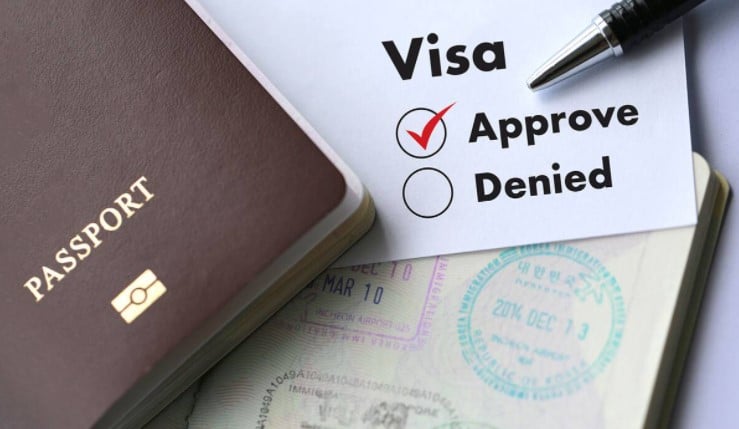German Visa Types
Requirements For German Visas
German visa types is determined by your reason for visiting and how long you want to stay in Germany. International visitors can apply for a variety of long-stay and short-stay visas in Germany.
German Visa Types

The visas are broadly classified as the following.
Type A visa: A transit visa is for travellers passing through Germany on their way to another nation. You may fly out of German airports. You are not permitted to enter Germany with this visa.
Type B Visa: This is a transit visa as well. To get to your next location, you may go across Germany’s territory. This visa is only valid for five days.
Type C Visa: This is a 90-day short-stay visa that permits you to stay in Germany for up to 90 days. This tourist visa is commonly referred to as the Schengen visa.
Type D Visa: This visa is for those who plan to stay in Germany for more than three months. This is referred as as a national visa, and it is also utilized for educational and research purposes.
What Makes People Travel to Germany?
Germany is one of Europe’s most populous countries. Travelers from all over the world have long been drawn to the area because of its rich history and stunning scenery.
Germany provides students with the greatest training and education, particularly in the disciplines of engineering and science. Hundreds of thousands of overseas students seek admission to German schools and universities for this reason.
The country’s strong career prospects and vibrant city life draw workers and professionals from all over the world to settle in Germany.
Is a Visa Required for All Nationalities Traveling to Germany?
No. It is not necessary for all nationalities to obtain a German visa in order to visit Germany. Before traveling or permanently relocating to Germany, you must first determine if you are a member of one of the countries exempted from requiring a German visa.
Nations That Do Not Require German Visa
If you are a citizen of one of the following countries, you do not need a German visa.
- European Economic Area (EEA)
- European Union (EU)
- Iceland
- Liechtenstein
- Norway
- Switzerland
Visa Requirements In Germany For EEA/Swiss/EU Nationals
Germany is one of the Schengen countries, which consists of 26 countries. Citizens of these countries are free to travel to the countries listed below.
List Of Countries That Do Not Require A German Visa |
|
| Austria | Liechtenstein |
| Belgium | Luxembourg |
| Czech Republic | Malta |
| Denmark | Netherlands |
| Estonia | Norway |
| Finland | Poland |
| Greece | Portugal |
| Hungary | Slovakia |
| Iceland | Slovenia |
| Italy | Spain |
| Latvia | Sweden |
| Lithuania | Switzerland |
These nations have a common visa and are free from border controls. If you are a citizen of one of these countries, you do not need a visa or a permission to live, study, visit, or work in Germany.
Visa Requirements For Other Nationals
If you are not from the EU, EEA, or Switzerland, you will need a Schengen visa to enter Germany for 90 days. Apart from the EEA and the EU, however, several nations are free from the visa requirement. They are as follows:
- Australia
- Canada
- Israel
- Japan
- New Zealand
- The Republic of Korea
- The USA
- Some of the countries from South America and Central America
To remain and work in Germany for more than 90 days, all of these nations require a resident permit.
To live and work in Germany, all nations except those adhering to the EEA and EU require a permission known as a “Residence Title.”
German Visa Types – Type A Visa
Type ‘A’ visa is for foreigners who desire to fly to another nation via one of Germany’s airports.
Airport Transit Visa
The visa is for foreign passengers flying out of one of Germany’s airports
This visa is only valid for a few hours, and you are not permitted to leave the airport.
Countries That Require Airport Transit Visa
People belonging to the following countries require this visa.
List Of Countries That Require Airport Transit Visa |
|
| Afghanistan | Mali |
| Bangladesh | Nigeria |
| Eritrea | Pakistan |
| Ethiopia | Somalia |
| Ghana | South Sudan |
| India | Sri Lanka |
| Iran | Sudan |
| Iraq | Syria |
| Jordan | Turkey |
| Lebanon | |
Type B Visa For Transit
Another type of transit visa is the B Visa.
This transit visa is necessary for foreign travelers passing through German territory on their way to another destination.
This visa has a maximum validity of 5 days.
Type C Visa- Short-Stay Visa
A short-stay visa can be applied for by an international traveler who plans to visit Germany for 90 days.
Schengen Visa
A Schengen visa permits you to visit Germany for a certain period of time.
This visa allows you to stay in Germany for a maximum of three months.
Why Apply For A Schengen Visa?
For the following reasons, you can apply for a Schengen visa:
- A vacation
- Tourism
- Short-term stays that are connected to your job or career
- Attend a seminar, conference, or workshop
- To attend a wedding/event
- Attending trade shows
- To enroll in a short-term program
- For medical and health care
How Does Schengen Visa Work?
- This visa can be applied for at a German consulate or embassy in the applicant’s home country.
- You are not permitted to convert this visa to a residence permit unless an extraordinary case develops.
- To obtain a residence permit, you must return to your home country and submit an application.
Type D- Visa- Long-Stay
For overseas tourists who do not belong to the EEA/EU/Swiss states, a Type D Visa, often known as a long-stay visa, is required.
This visa is for people who want to stay in Germany for more than three months.
The German National Visa is another name for this visa.
Uses of Type D- Visa
This visa can be used for a variety of purposes, including the ones listed below:
- Post-secondary education
- To apply for scholarships in Germany
- Participate in a research project
- To become a member of a family
- For the aim of finding work in Germany
- To have the status of a permanent resident
- In order to receive long-term medical treatment and care
How does the Type D-Visa Work?
This visa must be applied for at the individual’s home country.
Unless you are a citizen of the European Economic Area/European Union (EEA/EU) or Switzerland, you must apply for a D-Visa and a residency permit before entering Germany.
The visa application procedure might take many months. As a result, you must begin the process as soon as possible in order to obtain a German residence permit in a timely manner.
The long-stay visas in Germany are listed below.
Study Visa In Germany- Long -Stay
To study in Germany for a lengthy period of time, an international student needs a German student visa.
The visa is valid for two years, after which it can be extended by submitting an application.
This visa allows you to participate in any degree program or exchange program.
You can also use this visa to take a non-academic German course.
How To Apply For Study Visa In Germany- Long -stay
- To apply for this visa, you must be admitted into one of the state-approved institutions or colleges.
- The candidate must have enough money to cover the whole course price as well as living expenses in Germany for the duration of the program.
- The law allows international students in Germany to work for 120 hours (full days) or 240 hours (half days) to help defray part of their living costs.
Types of German Student Visa
German student visas are divided into three categories.
Student Applicant Visa For Germany
To apply for a student visa in person in Germany.
Valid only for the process of application
The applicant cannot study in Germany using this visa
Student Visa For Germany
International students who wish to study in Germany for a lengthy period of time must apply for this visa.
Visa For German Language Course
This visa permits you to study German at one of Germany’s approved universities.
German Visa Types – Long-Stay Employment Visa
This visa is intended for highly qualified professionals from outside Germany who can contribute to the German economy.
This visa allows international employees to work in Germany for an extended period of time.
Visa For Job-Seekers
If an individual is unable to find work in Germany, he or she may apply for a job seeker visa in Germany.
About Job Seekers Visa
This visa is only available to people who hold a German-recognized higher education degree or diploma.
During that period, the person must have sufficient finances to maintain his or her stay in Germany.
German Visa For Researchers -Long-Stay
If researchers, teachers, or scientists want to undertake research in their areas, they can apply for this visa.
The ability to communicate in German is not required for this long-term visa.
Family Re-Union Visa In Germany
If you have a family member who is a resident or citizen of Germany, you can apply for this visa if you live outside the EU/EEA.
Your family member must have sufficient space to accommodate you.
He or she must also be financially capable of supporting your stay in Germany.
Medical Treatment Visa In Germany: Long-Stay
This visa is for those who want to stay in Germany for a long time for medical or health reasons.
People who need to stay in the country for at least 6 months or longer for medical treatment must apply for this visa.
Self-Employment Visa In Germany (Freelance)
You must apply for this visa if you want to work as a freelancer in Germany.
About Self Employment Visa
This visa permits the applicant to stay in Germany for an extended period of time.
You must be able to sustain yourself financially.
The candidate must have the necessary financial resources to fund her or his freelancing project in Germany.
If the person is above 45 years old, he or she must provide proof that they will be able to support themselves in old age.
Internship Visa For Students In Germany
You should be offered an internship.
The approval of the FES (Federal Employment Agency) is required.
This visa must be applied for by the applicant’s employer.
This visa has a 12-month maximum stay limit.
Visa For A Language Course In Germany
Individuals who wish to take a language course in this nation for more than three months must apply for this visa.
This is a long-stay visa that is valid for a duration of up to 12 months.
Permanent Residency In Germany
Once you’ve lived in Germany for a few years, you can apply for this visa.
A common requirement is a five-year term.
There are certain exceptions, such as spouses of German nationals and graduates who have received a temporary work visa in Germany.
The individual can stay in the nation for as long as he or she wants, but he or she does not have voting rights.
How to Obtain German Citizenship
Once a person has lived in Germany for eight years, he or she can apply for citizenship.
People who have completed a German integration course have only seven years to complete the process.
After becoming a citizen, you will have access to all of the rights that a German citizen has, including the ability to vote.
German Visa Types – Refugees/Asylum Seekers
The German parliament has tightened the restrictions for refugees and asylum seekers.
New criteria have been added for migrants who want to study, work, or settle in Germany permanently.
To get the appropriate visa, an applicant must submit a completed and signed visa application, as well as the relevant supporting papers and the visa cost. The application must be submitted to the German consulate or embassy in your country of residency.
How quickly can I get my German visa?
The processing period for short-stay visas ranges from 2 to 10 working days. The processing of long-stay visas might take a lengthy period. It might take many months for a visa to be issued.
During the holidays, wait times are significantly longer. To have your visa granted on schedule, make sure you submit your applications as soon as possible.
In order not to miss out on prompt updates from careerinfos.com, enter your email address below and hit the subscribe button beneath.
A confirmation link will be sent to your inbox or check your spam mails if its not in your inbox. Make sure you click the link to confirm your subscription in order not to miss any updates from this blog. All comments (related to the post above) should be dropped via the comment section below.



